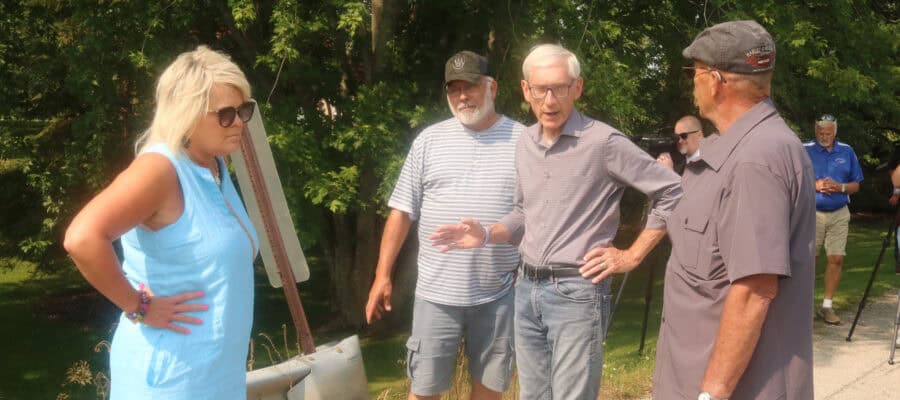Brian Roebke photo
Gov. Tony Evers (second from right) visits with Town of Morrison board members Jenny Wasmuth, Dennis Laabs, and Gary Koomen last week on Hill Road after the governor told town officials they received a $2 million grant for the reconstruction of 2.3 miles of Hill Road.
By Brian Roebke
Editor
The governor of the great state of Wisconsin rarely comes to Morrison, but he did make an appearance last week to visit with Town of Morrison officials, who received a $2 million grant for the reconstruction of 2.3 miles of Hill Road.
Gov. Tony Evers and Wisconsin Department of Transportation Secretary Craig Thompson visited grant recipients in the towns of Morrison and Maxville (Buffalo County) to highlight projects that received funding through the new Agricultural Roads Improvement Program.
The town plans to use the money to reconstruct Hill Road from Highway W to River Road in 2025.
The ARIP includes nearly $50 million in state investments to help support 37 projects across 28 Wisconsin counties, aimed at helping support Wisconsin’s farmers, producers, and agricultural industries by improving rural roads and bridges that are critical to moving and transporting products, crops, and livestock, among others, efficiently and effectively across the state. There were 160 applications.
“This project is really important,” Gov. Evers said. “Obviously agriculture is important to the State of Wisconsin but safety is really important also and the good news is this was part of the budget that was bipartisan,” he said.
He said this is just scratching the surface of the needs of municipalities.
A clerk at a town in western Wisconsin told him if they raised the sales tax in the State of Wisconsin by 1 percent and gave all that money for rural roads, it would take 10 years to fix all of them.
“It’s a huge issue and that’s why it’s really important and I’m glad I’m able to talk to some of the folks around this because it’s really important we do it right because we’re going to have to do it again and again and again (if it’s not done right),” he said.
Town Chairman Gary Koomen said when the road is finished, the town should never have to fix the road again.
“We’re in a place where the old roads are really thin and today’s equipment is really too heavy to be on them,” he said. “But we have to work with it anyway.”
Craig Schuh, manager of engineering services with Ayres Associates Inc., who helped the town with the application, said the town should not need to do any maintenance on the road for the first 20 years.
Thompson said he knows the town can’t afford this kind of money, and that’s why the state has this program.
“The roadway will be replaced with 14 inches of base course aggregate, geogrid reinforcement, and four inches of asphalt pavement,” Schuh said. “Similar to existing, the proposed roadway will have two 11-foot-wide lanes, with 2.5-foot-wide aggregate shoulders on both sides with 3:1 ditch fore slopes.”
Several cross culverts will be replaced to ensure the integrity of the new roadway.
The large bridge to cross an unnamed waterway approximately 600’ east of the Bocks Road/Hill Road intersection cannot be replaced under this funding source, but options are being explored for more ways to fund that replacement.
Schuh noted the roadway is in fair condition with significant amounts of alligator and transverse cracking, as well as weathering throughout. There are also a number of ruts and potholes along the proposed corridor.
“Any maintenance work done by the town has not and will not address the posted weight limit issue for nearby agricultural producers, nor does it address the underlying subgrade, base course, and asphalt pavement deficiencies that have led to rutting, cracking, and potholes throughout the corridor,” Schuh said.
Nearby agricultural producers (predominantly cover crop and corn producers) in the area were utilizing Hill Road as a preferred trucking route.
However, due to the current posted weight limit of 25 tons, they currently cannot use Hill Road with loaded trucks, leading to an increase in drive time for a detour route.
The nearby producers would also reduce wear and tear on their trucks as well as decrease heavier loads on alternative route roads as a result of the proposed project and the removal of the posted weight limit.
Representative Shae Sortwell (R-Gibson) and Senator André Jacque (R-De Pere) released a statement later in the day after they were invited the morning of the governor’s 9:45 a.m. visit. They did not attend the visit.
“Governor Evers and his administration have a track record of withholding information from the public, denying access to records from his office,” Rep. Sortwell said. “Contin-uing his poor communication practices, his staff informed Senator Jacque and my offices just an hour before the beginning of a local event he was leading in our districts to promote a program written by the legislature.”
Sortwell added the 2nd Assembly District Office contacted the Town of Morrison to understand how far in advance the governor’s office reached out to set up the event.
The town received communication from Evers’ staff six days earlier and was told in an email to not contact local state elected officials about the event.

